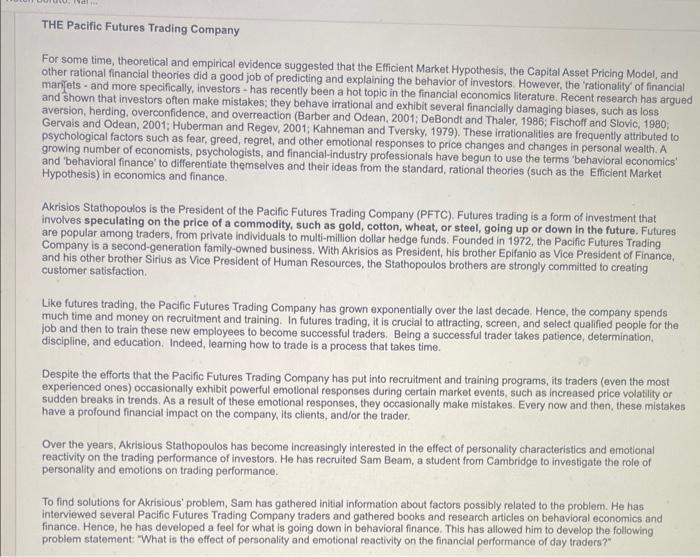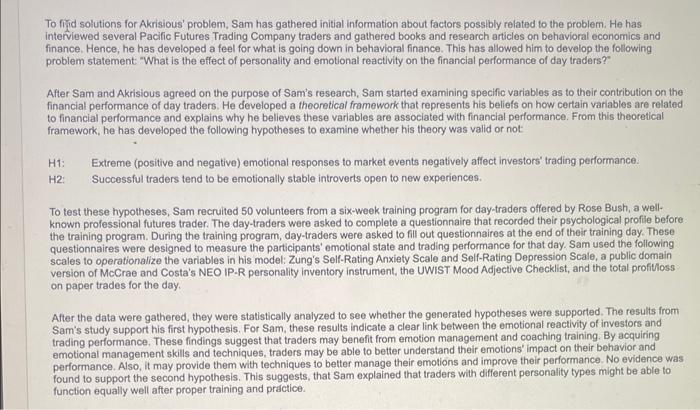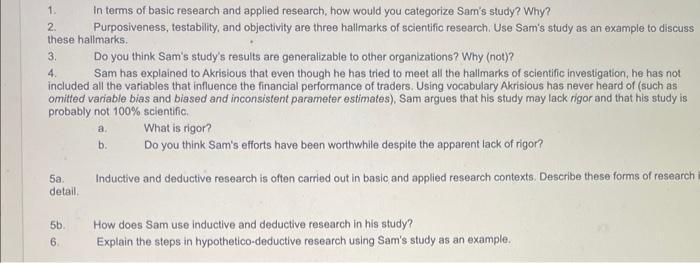Answered step by step
Verified Expert Solution
Question
1 Approved Answer
THE Pacific Futures Trading Company For some time, theoretical and empirical evidence suggested that the Efficient Market Hypothesis, the Capital Asset Pricing Model, and



THE Pacific Futures Trading Company For some time, theoretical and empirical evidence suggested that the Efficient Market Hypothesis, the Capital Asset Pricing Model, and other rational financial theories did a good job of predicting and explaining the behavior of investors. However, the 'rationality of financial marifets - and more specifically, investors - has recently been a hot topic in the financial economics literature. Recent research has argued and shown that investors often make mistakes; they behave irrational and exhibit several financially damaging biases, such as loss aversion, herding, overconfidence, and overreaction (Barber and Odean, 2001; DeBondt and Thaler, 1986; Fischoff and Slovic, 1980; Gervais and Odean, 2001; Huberman and Regev, 2001; Kahneman and Tversky, 1979). These irrationalities are frequently attributed to psychological factors such as fear, greed, regret, and other emotional responses to price changes and changes in personal wealth. A growing number of economists, psychologists, and financial-industry professionals have begun to use the terms behavioral economics and 'behavioral finance' to differentiate themselves and their ideas from the standard, rational theories (such as the Efficient Market Hypothesis) in economics and finance. Akrisios Stathopoulos is the President of the Pacific Futures Trading Company (PFTC). Futures trading is a form of investment that involves speculating on the price of a commodity, such as gold, cotton, wheat, or steel, going up or down in the future. Futures are popular among traders, from private individuals to multi-million dollar hedge funds. Founded in 1972, the Pacific Futures Trading Company is a second-generation family-owned business. With Akrisios as President, his brother Epifanio as Vice President of Finance, and his other brother Sirius as Vice President of Human Resources, the Stathopoulos brothers are strongly committed to creating customer satisfaction. Like futures trading, the Pacific Futures Trading Company has grown exponentially over the last decade. Hence, the company spends much time and money on recruitment and training. In futures trading, it is crucial to attracting, screen, and select qualified people for the job and then to train these new employees to become successful traders. Being a successful trader takes patience, determination, discipline, and education. Indeed, learning how to trade is a process that takes time. Despite the efforts that the Pacific Futures Trading Company has put into recruitment and training programs, its traders (even the most experienced ones) occasionally exhibit powerful emotional responses during certain market events, such as increased price volatility or sudden breaks in trends. As a result of these emotional responses, they occasionally make mistakes. Every now and then, these mistakes have a profound financial impact on the company, its clients, and/or the trader. Over the years, Akrisious Stathopoulos has become increasingly interested in the effect of personality characteristics and emotional reactivity on the trading performance of investors. He has recruited Sam Beam, a student from Cambridge to investigate the role of personality and emotions on trading performance. To find solutions for Akrisious' problem, Sam has gathered initial information about factors possibly related to the problem. He has interviewed several Pacific Futures Trading Company traders and gathered books and research articles on behavioral economics and finance. Hence, he has developed a feel for what is going down in behavioral finance. This has allowed him to develop the following problem statement: "What is the effect of personality and emotional reactivity on the financial performance of day traders?" To find solutions for Akrisious' problem, Sam has gathered initial information about factors possibly related to the problem. He has interviewed several Pacific Futures Trading Company traders and gathered books and research articles on behavioral economics and finance. Hence, he has developed a feel for what is going down in behavioral finance. This has allowed him to develop the following problem statement: "What is the effect of personality and emotional reactivity on the financial performance of day traders?" After Sam and Akrisious agreed on the purpose of Sam's research, Sam started examining specific variables as to their contribution on the financial performance of day traders. He developed a theoretical framework that represents his beliefs on how certain variables are related to financial performance and explains why he believes these variables are associated with financial performance. From this theoretical framework, he has developed the following hypotheses to examine whether his theory was valid or not H1: Extreme (positive and negative) emotional responses to market events negatively affect investors' trading performance. H2: Successful traders tend to be emotionally stable introverts open to new experiences. To test these hypotheses, Sam recruited 50 volunteers from a six-week training program for day-traders offered by Rose Bush, a well- known professional futures trader. The day-traders were asked to complete a questionnaire that recorded their psychological profile before. the training program. During the training program, day-traders were asked to fill out questionnaires at the end of their training day. These questionnaires were designed to measure the participants' emotional state and trading performance for that day. Sam used the following scales to operationalize the variables in his model: Zung's Self-Rating Anxiety Scale and Self-Rating Depression Scale, a public domain version of McCrae and Costa's NEO IP-R personality inventory instrument, the UWIST Mood Adjective Checklist, and the total profit/loss on paper trades for the day. After the data were gathered, they were statistically analyzed to see whether the generated hypotheses were supported. The results from Sam's study support his first hypothesis. For Sam, these results indicate a clear link between the emotional reactivity of investors and trading performance. These findings suggest that traders may benefit from emotion management and coaching training. By acquiring emotional management skills and techniques, traders may be able to better understand their emotions' impact on their behavior and performance. Also, it may provide them with techniques to better manage their emotions and improve their performance. No evidence was found to support the second hypothesis. This suggests, that Sam explained that traders with different personality types might be able to function equally well after proper training and practice. 1. 2. these hallmarks. 3. 4. Do you think Sam's study's results are generalizable to other organizations? Why (not)? Sam has explained to Akrisious that even though he has tried to meet all the hallmarks of scientific investigation, he has not included all the variables that influence the financial performance of traders. Using vocabulary Akrisious has never heard of (such as omitted variable bias and biased and inconsistent parameter estimates), Sam argues that his study may lack rigor and that his study is probably not 100% scientific. In terms of basic research and applied research, how would you categorize Sam's study? Why? Purposiveness, testability, and objectivity are three hallmarks of scientific research. Use Sam's study as an example to discuss 5a: detail. 5b. 6. What is rigor? Do you think Sam's efforts have been worthwhile despite the apparent lack of rigor? Inductive and deductive research is often carried out in basic and applied research contexts. Describe these forms of research a. b. How does Sam use inductive and deductive research in his study? Explain the steps in hypothetico-deductive research using Sam's study as an example.
Step by Step Solution
★★★★★
3.20 Rating (147 Votes )
There are 3 Steps involved in it
Step: 1
Question Q1 I would consider Sams study applied research Applies research is used to solve a very specific problem in a specific scenario The issue needs some sort of solution or alternative that will ...
Get Instant Access to Expert-Tailored Solutions
See step-by-step solutions with expert insights and AI powered tools for academic success
Step: 2

Step: 3

Ace Your Homework with AI
Get the answers you need in no time with our AI-driven, step-by-step assistance
Get Started


